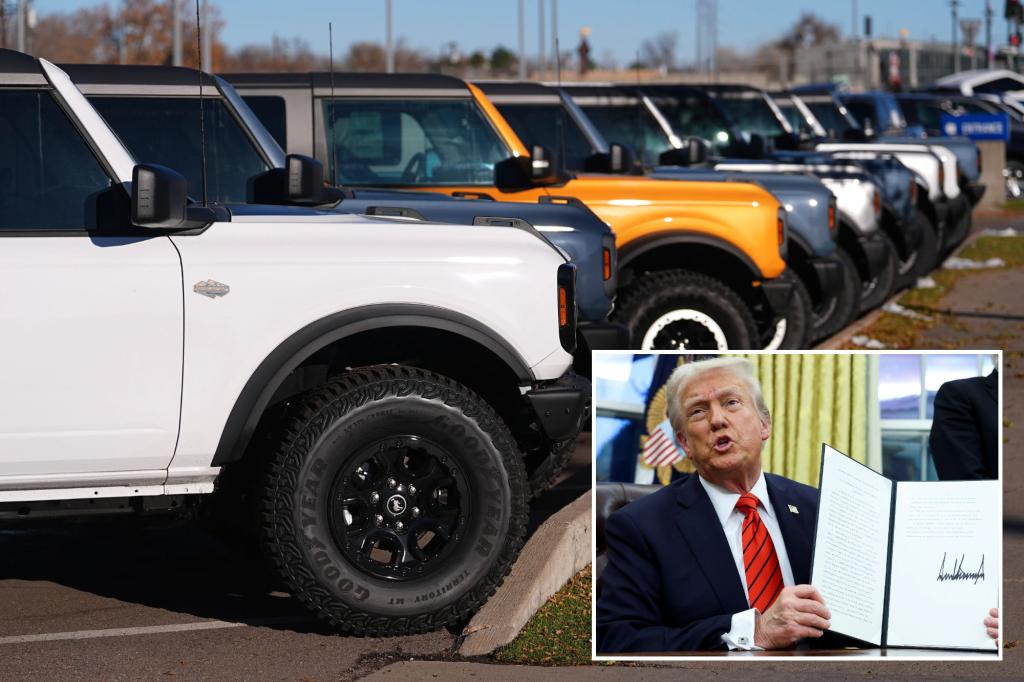New car prices could rise by as much as $12,000 following President Trump’s tariffs on Canada and Mexico, according to a report. The 25% tariffs imposed on these neighboring countries would increase the cost to build a crossover utility vehicle by at least $4,000, based on a study from Anderson Economic Group, an automotive research firm. For electric vehicles, the cost increase would be three times higher, and these costs are likely to be passed on to consumers, Bloomberg reported. “That kind of cost increase will lead directly — and I expect almost immediately — to a decline in sales of the models that have the biggest trade impacts,” said Patrick Anderson, the firm’s chief executive. Current vehicle prices are already high due to pandemic-era inflation, nearing $50,000 on average for new cars. The average transaction price last month was $49,740, just $200 less than its December 2022 peak, according to Kelley Blue Book. After a month-long pause, Trump’s tariffs are set to take effect on Tuesday. Experts warn that these taxes could exacerbate price hikes across the auto industry and force carmakers to halt production of some popular models, such as the Chevrolet Silverado pickup and Ford Bronco Sport SUV. Auto executives, including Ford CEO Jim Farley, have expressed concerns, stating that the tariffs would “blow a hole in the US industry that we have never seen.” Executives from General Motors, Ford, and Stellantis met with the Commerce Department last week to discuss their concerns. They requested that the White House focus solely on imported cars without US-made parts, as many US-manufactured vehicles contain parts from other countries. Tesla, led by Elon Musk, produces all its US-sold cars domestically but still uses about 20% of parts from Mexico, according to the National Highway Traffic Safety Administration. Auto sales are expected to decline under the tariffs as consumers avoid potentially record-breaking prices. Dan Hearsch, leader of the Americas automotive unit at AlixPartners, predicted that US auto sales could fall by as much as half a million vehicles as automakers pause production of some models made in Canada and Mexico. “Some of those vehicles that can’t be produced in the US just probably won’t be made for a while,” Hearsch told Bloomberg. Ford’s Maverick pickup truck, Bronco Sport SUV, and electric Mustang Mach-E are made in Mexico. GM produces its Chevrolet Silverado pickups in Mexico, Canada, and the US, while Stellantis manufactures Ram pickups in Mexico and the US. Automakers will face challenges replacing steps in their complex North American supply chains quickly. “You’ll see some model and trim types just disappear,” Anderson told Bloomberg. Honda has reportedly scrapped plans to manufacture its latest Civic model in Mexico, shifting to its Indiana facility, according to Reuters. Stellantis reversed plans to close its Illinois plant in January after its chairman met with Trump and promised to boost US manufacturing jobs. Volkswagen is reportedly considering US production sites for its Audi and Porsche brands to avoid the proposed taxes, according to a German news outlet. Automakers have been rushing to move materials over the border into the US ahead of the tariffs. “It’s got everybody in an absolute spin,” Hearsch said. Secretary of Commerce Howard Lutnick confirmed that the planned tariffs would proceed on Tuesday. It remains unclear how long the taxes will stay in place, as the White House stated they aim to pressure neighboring countries to curb illegal fentanyl smuggling. — news from New York Post
